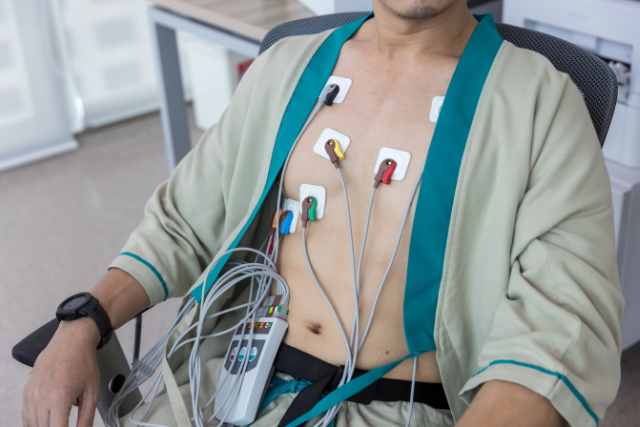Holter

Holter Monitoring is a valuable and portable tool that records your heart’s activity continuously for a specific period, usually 24 to 48 hours as per your cardiologist advice. This non-invasive test provides insights and crucial data about your heart’s behaviour during your daily activities.
Turnaround Time for Reports
After you’ve completed the monitoring period, the recorded data is analyzed by a cardiologist. The turnaround time for receiving your Holter Monitoring report may vary, but you can typically expect it within 24 hours.
Why Your Cardiologist Has Advised Holter Monitoring
If you are someone who is experiencing symptoms like palpitations, dizziness, chest pain, or unexplained fainting your cardiologist might recommend you for Holter monitoring after correlation with other presented symptoms. These symptoms can be intermittent or acute and difficult to capture during a regular office visit. Holter Monitoring helps to record such episodes, providing crucial insights for an accurate diagnosis.
Know the procedure
Device Placement: Holter device is highly compact and light weight. It is attached to your chest by using adhesive patches as it’s meant to be worn for minimum of 24-48 hours. The setup of this device is usually done by a skilled technician who specializes in cardiology at the comfort of your comfort.
Electrode Placement: To capture a detailed picture of your heart’s electrical activity, several electrodes are strategically placed on your chest. These electrodes act as sensors, detecting the electrical signals that originate in your heart with each heartbeat.
These electrodes then are connected to the Holter monitor, forming a direct link between your heart’s electrical signals and the device itself.
Wearing the Device: Once the Holter monitor is securely in place and the electrodes are connected, you’ll wear the device for the prescribed duration. This duration typically ranges from 24 to 48 hours.
While wearing the Holter monitor, it’s essential to go about your daily activities as you normally would. This includes work, exercise, meals, and even sleep. The goal is to capture your heart’s behaviors’ under real-life conditions, as this data provides a comprehensive understanding of your heart’s function.
Things to Know Before Undergoing Holter Monitoring
Before you undergo Holter Monitoring, it’s essential to communicate certain information with your cardiologist. This includes details about your current health condition, any medications you are taking, and any symptoms you’ve been experiencing. The more information you provide, the better your cardiologist can interpret the results accurately.
Book An Appointment


